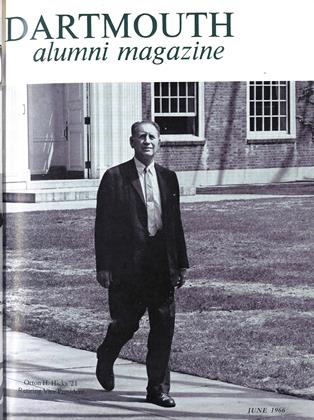SINCE 4:45 p.m., May 2, when he learned that he had won the Pulitzer Prize for Poetry for 1966, Prof. Richard G. Eberhart '26 has had only a few moments when his feet touched the ground. Part of the reason was the sheer elation of winning; the remainder was the quickened pace of engagements and appearances that have kept him constantly on the move ever since.
He had learned of the award when his publisher from New Directions Press in New York called as he was about to leave his house to mail a letter. Two hours later the Pulitzer Committee notified him formally.
"I'm delighted, of course," he said that afternoon. "This is the oldest serious literary prize in this country and every writer, I suppose, aspires to it."
His fellow poet and Dartmouth contemporary, Alexander Laing '25, had some words on this Pulitzer award too as he introduced Professor Eberhart at a poetry reading in Spaulding Auditorium which attracted over 600 persons. The words: "It's about time!"
Prizes, however, are not new to Professor Eberhart. This is the second of the "big three" poetry prizes (the Pulitzer and Bollingen Prizes and the National Book Award) that he has won. He was awarded the Bollingen Prize in 1962. Other prizes have included the Harriet Monroe Memorial Prize, the Harriet Monroe Memorial Award, and "the Shelley Memorial Prize.
Eberhart served as Consultant in Poetry at the Library of Congress from 1959-61, succeeding his friend and fellow alumnus, Robert Frost, and currently he is an honorary Consultant in American Letters to the Library of Congress.
The Pulitzer Prize was awarded for his latest book, Selected Poems: 1930-1965, which, Professor Eberhart says, leans "toward the lyrical and easily understood." Over the years, though, Professor Eberhart has puzzled many poetry critics. He has been described as "stark" in one instance and "visionary" in another; "moralistic" in one place and "romantic" in another.
Some of his own views on poetry may explain why. He wrote recently:
"Poetry may arise in man at any time. It is, in fact, unpredictable. Most dogmatic statements about poetry will not hold for long. Its mercurial essence will spring out in some new, unexpected way, demanding new evaluative judgments. Of all the statements I have read about poetry the one which seems to be most usable for the longest time is Coleridge's when he said that poetry 'gives most pleasure when only generally and not perfectly understood.' This assertion gives a handsome leeway to every man."
In his introductory remarks Alex Laing described his friend's background as romantic, as befits a poet. Born in Austin, Minn., he was graduated from Dartmouth in 1926 and promptly set out to work his way around the world aboard a freighter. He was a tutor to the son of King Prajadhipok of Siam for a year, a teacher at St. Mark's School (where one of his pupils was another fine American poet, Robert Lowell), and a naval aircraft gunnery instructor in World War II.
All the while he wrote and published poetry.
After World War II he began work for the Butcher Polish Co., but in 1952 he was, as he explains it, "called, just as ministers are called to a pastorate." He was poet-in-residence at the University of Washington, the University of Connecticut, Wheaton College, and at Princeton before returning to his alma mater in 1956.
The years at Dartmouth have passed all too quickly, he said. He has published five books (Great Praises in 1957, Collected Poems, 1930-1960 in 1960, TheQuarry in 1964, Collected Verse Plays in 1962 and his Selected Poems: 1930-1965 in 1965), and has conducted two or three seminars each year. Most mornings find him in his Sanborn House office where the door is open to his creative writing students and other student poets.
Since accepting the Pulitzer Prize in New York he has taken four students to Harvard and to Bennington for readings of their poetry. And this led The Dartmouth to remark admiringly, "At 62, he still has the spirit of a Dartmouth roadtripper."
Richard Eberhart '26 with a head of himself done by Dartmouth sculptor Winslow Eaves and recently shown in Baker.
 View Full Issue
View Full Issue
More From This Issue
-
 Feature
FeatureThe Lifelong Association of Thayer and Ticknor
June 1966 By COLONEL ROBERT S. DAY, USA -
 Feature
FeatureRETIRING FACULTY
June 1966 -
 Feature
FeatureAlumni Chief Retires This Month
June 1966 By CLIFFORD L. JORDAN '45 -
 Feature
FeatureDr. Carleton B. Chapman Appointed Dean of Dartmouth Medical School
June 1966 -
 Article
ArticleWith the Big Green Teams
June 1966 By PETE GOLENBOCK '67 -
 Class Notes
Class Notes1932
June 1966 By JILDO CAPPIO, ALBERT C. BONCUTTER
G.O'C.
Article
-
 Article
ArticleHEATING AND LIGHTING THE COLLEGE BUILDINGS
March 1912 -
 Article
ArticleREMAINS OF LATE PROFESSOR HITCHCOCK BURIED AT HANOVER
June 1921 -
 Article
ArticleRECEPTION TO MAJOR REDINGTON "61 IN SOUTHERN CALIFORNIA
December, 1923 -
 Article
ArticleMarks' Body Found
May 1934 -
 Article
ArticleThe Hidden Life of College Students
May 1998 -
 Article
ArticleWhat Makes Hogarty Run?
April 1955 By R.L.A.



